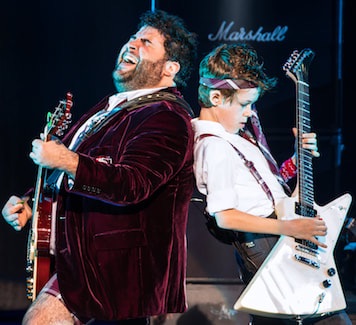Review:
"School of Rock The Musical"

Run of engagement: Feb. 13-18 at the Bass Concert Hall
For those about to learn to rock, we salute you. Based on the 2003 Jack Black comedy directed by Austin-based Richard Linklater and written by Mike White, Andrew Lloyd Webber’s Broadway touring production of School of Rock The Musical arrives at the Bass Concert Hall to passionately stick it to the “Man” through Feb. 18. Bursting with youthful energy and an infectious appreciation for music, this latest Broadway adaptation of a Hollywood hit is very much the same School of Rock that you know and love with a few minor exceptions. With a book by Gosford Park screenwriter and Downton Abbey creator Julian Fellowes of all other people (he’s also a Conservative peer of the U.K.’s House of Lords, which technically makes him the “Man”), School of Rock The Musical reintroduces us to man-child Dewey Finn, the failed singer/guitarist who pretends to be a substitute at the prestigious Horace Green prep school to earn his rent money. Realizing some of the fourth-graders under his care can play music instruments with expertise, Dewey recruits his students to perform with him or help him behind the scenes to land an audition for an upcoming “Battle of the Bands” contest. As with the film, Laurence Connor’s briskly directed musical focuses on the relationship between Dewey and his students as well as the life lessons they learn from each other. The show takes place mainly in Dewey’s classroom, one that surprisingly lacks the modern technology found in pricey private schools, but the functionally decorated set is quickly reassembled to pass as the apartment Dewey shares with his pal Ned Schneebly, a local dive bar, and the concert venue that hosts the Battle of the Bands. Beyond ensuring a smooth transition from screen to stage, Fellowes rarely deviates from his source material unless it is to condense or expand upon the obstacles that Dewey faces in his bid to become a rock legend (at least in his own mind). Dewey’s roommate Ned Schneebly, of course, is the substitute teacher Dewey poses as in order to get the desirable temporary position at Horace Green. Fellowes steers the relationship between Dewey and Horace Green’s formidable Principal Rosario Mullins into romantic territory late in the production. He also takes us into the homes of some of Dewey’s students who feel somewhat alienated from their demanding parents, which is something Linklater and White choose to avoid for the most part. The fundamental difference between the film and this show lies with its songs, several of which fortunately happen to give a greater voice to Mullins and the young rockers. Linklater and White were able to indulge in their love of 1970s and 1980s rock by stuffing their School of Rock with excerpts from classic tracks by AC/DC, David Bowie, Cream, The Doors, Led Zeppelin and T. Rex. But Webber and lyricist Glenn Slater—responsible for the music and lyrics, respectively—wisely avoid turning School of Rock into a jukebox musical. With the exception of Stevie Nicks’ “Edge of Seventeen,” which remains as meaningful to Principal Mullins here as it does in the film, School of Rock The Musical avoids all the iconic and influential songs that Dewey loves in favor of original songs by Webber and Slater. As the stern and seemingly inflexible Mullins, the no-nonsense Lexie Dorsett Sharp belts out the power ballad “Where Did the Rock Go?” with all the painful regret of a lonely person who chosen to cut out all the fun in her life in order to devote every waking minute to her career. The kids also communicate their displeasure with their parents in the other standout original song, “If Only You Would Listen.” The songs written for Dewey, most notably “When I Climb to the Top of Mount Rock,” fail to make much of an impression. They come across as the Broadway equivalent of corporate rock songs. Needless to say, the songs that remain the catchiest are the ones carried over from the film: “In the End of Time,” with its earwormy chorus “You're not hardcore (no you're not hardcore),” “Stick It to the Man,” and “School of Rock.” Rob Colletti, stuck with the unenviable task of making us forget Jack Black, rocks as hard as they come as Dewey. But his Dewey isn’t particularly charming or engaging, and he is lacking in necessary inspirational qualities. Colletti does possess a close rapport with his young castmates, which brings warmth and authenticity to their interactions in both in the classroom and on the concert stage. The kids embrace their roles with gusto and bounce around the stage with such gleefulness that it’s impossible not to be caught up in their enthusiasm. The kids in the band—guitarist Phoenix Schuman, bassist Theodora Silverman, keyboardist Theo Mitchell-Penner, and drummer Gilberto Moretti-Hamilton—play their own instruments with a proficiency beyond their years. Gianna Harris, who plays the timid lead singer Tomika, has a sturdy set of pipes on her that suggests she has a great future either on Broadway or as a solo artist in her right. The scene-stealer, though, is the boisterous and assured Ava Briglia as the band manager Summer. She’s the very embodiment of School of Rock’s can-do attitude. “Rock got no reason, rock got no rhyme,” Dewey announces during the show’s title song. What rock does have—and this extends to all genres of music and the arts in general—is the ability to open minds, spark creativity, and increase self-worth. So keep doing the God of Rock’s good work, School of Rock. Robert Sims Aired: Feb. 15, 2018 Web sites: https://texasperformingarts.org https://ustour.schoolofrockthemusical.com |
|
